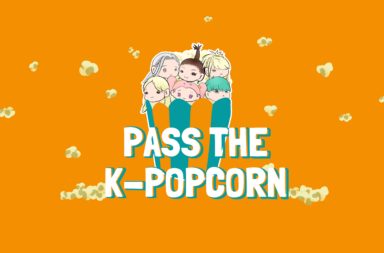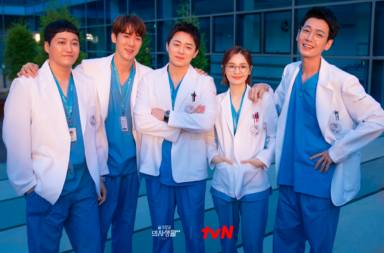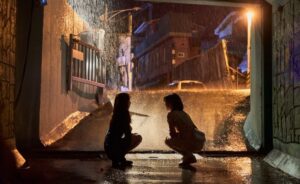
When I wrote the first part of “K-dramas at the End of the World”, I was hesitant to suggest that I would ever write another part to the article–and yet, here we are again. The pandemic continues… and it’s hard to separate entertainment from it, especially with all the K-drama postponements. Since Part 1, everything feels more seemingly normal, we have moved into “pandemic times”–new rhythms of life–with perhaps too much ease. This altered relationship with time is defined primarily by the sense that time is moving more slowly and that the future, time post-pandemic is distant and that everything is just chaos and uncertainty.
Also, the pandemic should mean more time for K-dramas, as some of us have become “billionaires of time” with many obligations long abandoned. However, despite the extra time I have at home, I watch far less than I had expected. What are K-dramas really when it seems like the end of the world?
Arundhati Roy
In some way or another, many good K-dramas are about time. TV shows can be a way of imagining new, better worlds and futures, and of highlighting the gap between the world as it is and the world as it should be. Just consider the genres and forms of sci-fi, fantasy, time-travel, dystopian and utopian futures, and social commentary. They invite us to contemplate various issues and possibilities for the world beyond the limitations of the now. If pandemics are portals, gateways between one world and the next, art, TV, K-dramas can be a place of reckoning, brimming with hope for our time, showing us a way forward.
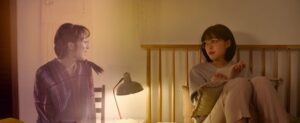
In each episode of the currently airing MBC short drama series, SF8, a different writer and director set out a new world for viewers to discover, ones for both near and distant futures. Within the limitations that they had with budget and time, they have attempted something quite ambitious for the small screen, inviting us to contemplate possible conflicts of tomorrow rooted in developments of today (the possible only exception is Ahn Guk-jin’s “Baby It’s Over Outside”).
At a press conference prior to the show, the director Min Gyoo-dong as the executive producer of the show stated, “We have a stereotype that sci-fi productions usually come with visual spectacles. But with ‘SF8,’ we wanted to make a story that gives the viewers something to think deeply about.” Personally, the episodes so far have been a mixed bag–inventive and visually gorgeous, yet also often heavy-handed and filled with endless exposition in an attempt to provide quick world-building in the brief screen time.
Lee Yoon-jung‘s “Joan’s Galaxy” (episode 3 of SF8) stands out with how it offsets these issues with its tender, queer love story. Based on a short story, it is about a world with a layer of fine dust where people are divided between Cs (Clean) and Ns (Non-Clean). Cs are given an expensive vaccine at birth, and have a life expectancy of 100 years. In contrast, Ns are not given the vaccine and can only live up to 30 years. While the story functions well as an allegory for the consequences of climate change and class divisions, it is mainly about dealing with an uncertain future and the fragility of life. We follow Yio (Choi Sung-eun) as she reckons with the fact that she thought that she was a C, but is really an N due to a medical mistake.
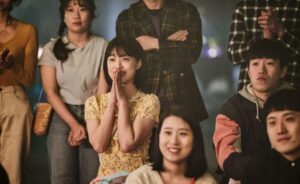
After discovering this mistake, Yio becomes obsessed with discovering more about the lives of Ns, in particular that of a girl named Joan (Kim Bo-ra). The title references how the show is concerned with Joan’s approach to life, her thinking, her “galaxy”. In a world so obsessed with determining how much time they left, Joan remains determined to live solely in the present. Joan’s response to hearing about Yio’s situation is remarkably nonchalant and calm; later over a hologram call, she tells Yio, “If you really don’t have much time left, you should do the things that you like.” For Joan, this transience is not about being an N necessarily, but rather part of being human, a precarious being–“I have to run towards the things that I love.”
Within its dystopian setting, the episode highlights the beauty and value of experiences, however fleeting they are. With Joan, Yio opens herself up to new experiences: they go to a small concert, they feel the rain on their skin and stare in wonder at the projected stars of the planetarium. While in some ways, Joan does function as a teaching tool for Yio, she is much more than that, particularly in the final few scenes as their positions change and they are forced to part. The underlying melancholy of the show bubbles up to the surface as Joan cries during a presentation that they were supposed to do together. The short lives of Ns, the brevity of their lives is shown to be a double-edged sword, a bringer of joy and pain.

Despite my general dislike of hospital dramas, as the pandemic continued, I ended up watching two hospital dramas back to back–Hospital Playlist (2020) and Obstetrics and Gynecology Doctors (OB/GY) (2010), written by Choi Hee-ra. I had been deeply frustrated with Hospital Playlist and its approach to the medical genre. I found myself thinking of other medical dramas (in particular, the bold anger of Romantic Doctor Kim), and wondering about what Hospital Playlist was lacking.
Hospital Playlist director Shin Won-ho had promised a fresh, different approach to this highly popular K-drama genre, but I found it to be grating, banal, and sentimentalized. All of the hospital cases were resolved easily within each episode, with little to no tension and no real reckoning of the complicated issues at hand. Rather, the show was reliant on the preachy, simplistic and generalised one-liners of the doctors to be taken as the absolute truth. While there were attempts to tackle big medical issues, these were unconvincing, mostly limited to some stock thinly-written bad doctor and patient types or brushed aside quickly. What the show seemed to be saying was that there were no real issues in hospitals at all; everything is perfectly fine as it is.
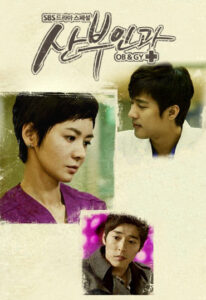
Good hospital dramas engage at an intellectual and emotional level with experiences of socially significant health issues such as poverty, domestic violence, substance abuse, and chronic and critical illness. They mine social attitudes regarding broader issues within society such as race, class, sex, gender and ethnicity, as rich sources of dramatic conflict. Hospital Playlist is a pleasant ensemble show about friendship, but as a medical drama, it’s mediocre at best. Watching OB/GYN made me realise this: it is lived in, complex, and empathetic. It tackled big issues that were rarely seen on TV, including lookism, infanticide, rape, and teenage pregnancies. It did so with sensitivity, highlighting the societal issues at play, especially patriarchal forces. There were no easy answers or solutions; instead, there was an understanding of the multilayered nature of these issues and the real tension they created. OB/GYN is a show that refused to, in words of writer Anne Boyer, “propagandise for the world as is.”
Recently, I also finished The Queen’s Classroom (2013), a sharp, illuminating drama about the preparation children get for the real adult world that resonates strongly in these times. The show depicts the conflicts and struggles between a cold-hearted female teacher, Ma Yeo-jin (Go Hyun-jung), who enacts a series of strict rules that install a hierarchy within her class and her students over a school year. She shows favouritism towards the smart students and scorns the underachieving ones, benefiting the cleverer students with constant access to her support, excusing them from chores, and allowing them to pick their seats and be first in line for lunch.
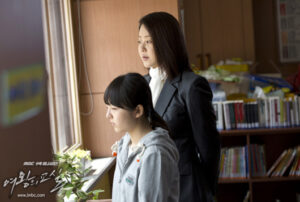
Ma Yeo-jin justifies her action by stating that this is the way of their capitalist, individualist society, saying “Isn’t it the rule of society. The school is no exception.” Under her, the classroom becomes a hierarchical, totalitarian police state. With these rules, Ma Yeo-jin and the show, in turn, highlight both the brutal capitalist, controlling structures of society and also the way that school often operates as a training ground for the acceptance of the terrible ways of the adult world. There are many responses within the student group to these methods, but the one that the show pays the most attention and rewards is the lead characters forming their own caring community. In The Queen’s Classroom, solidarity and care are shown as the way forward for a better future and necessary for real change.
Watching these K-dramas reminded me the power and value of imagination and creativity, particularly in these difficult times for allowing us to go beyond the present. It is a deeply comforting and necessary thing to have knowing that nothing lasts forever and that there is hope, even at the seeming end of the world.
What lies ahead?
Arundhati Roy, Azadi: Freedom. Fascism. Fiction
Re-imagining the world.
Only that.
(Images via MBC, tVN, SBS)
